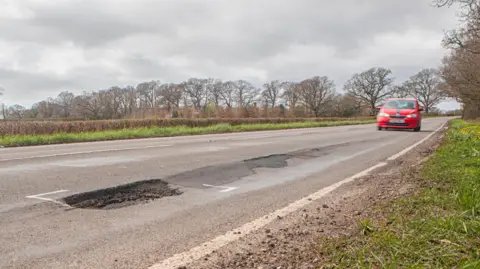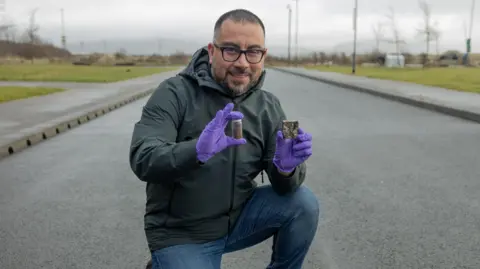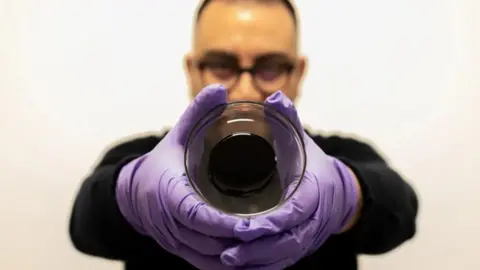'Self-healing' roads aim to solve pothole crisis
 Getty Images
Getty ImagesSelf-healing asphalt roads could soon offer a solution to the UK's pothole crisis, according to new research.
Designed with artificial intelligence (AI), a new type of asphalt made from biomass waste can mend its own cracks without the need for maintenance or human intervention.
Scientists at Swansea University, King's College London and from Chile have found methods to "stitch" asphalt back together, hoping to create more durable and sustainable roads.
Also known as bitumen, asphalt is a sticky black substance derived from crude oil, widely used to construct roads, highways and airport runways.
As it hardens through oxidisation it becomes prone to cracks, but researchers have developed methods to "stitch" asphalt back together, creating more durable roads.
Lead researcher and expert in self-healing asphalt at Swansea University, Dr Joe Norambuena-Contreras, said the approach would help the develop net-zero roads as road carbon emissions can largely be linked to asphalt production.
He has called upon both the UK Government and private sector to invest in the initiative to meet net-zero targets.
 Swansea University
Swansea UniversityDr Francisco Martin-Martinez of King's College London, said the research aims to mimic the healing properties observed in nature.
"Creating asphalt that can heal itself will increase the durability of roads and reduce the need for people to fill in potholes," he said.
He added the study will also use sustainable materials in the new asphalt, including biomass waste, reducing the dependence on natural resources.
While still in development, the research team said there is potential to improve infrastructure and advance sustainability globally.
 Swansea University
Swansea UniversityLocal road conditions in England and Wales were at an all-time low in 2024 due to "decades of underfunding", according to an annual survey by the Asphalt Industry Alliance.
It estimated it would cost more than £16bn to tackle the backlog of repairs.
Some communities in Wrexham county recently resorted to making their crater-filled village a tourist attraction, branding it "Pothole land".
Fed up residents say the conditions have become so bad, visitors and delivery drivers refuse to drive to their homes.
